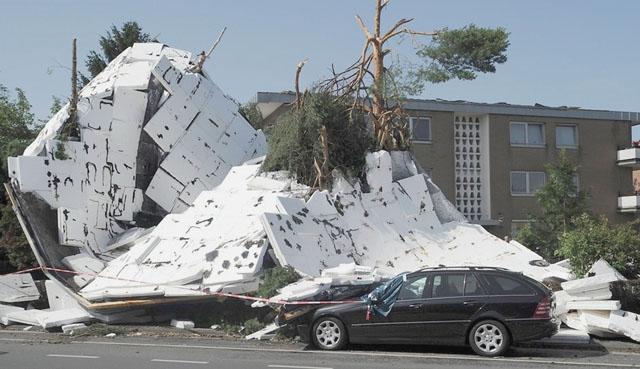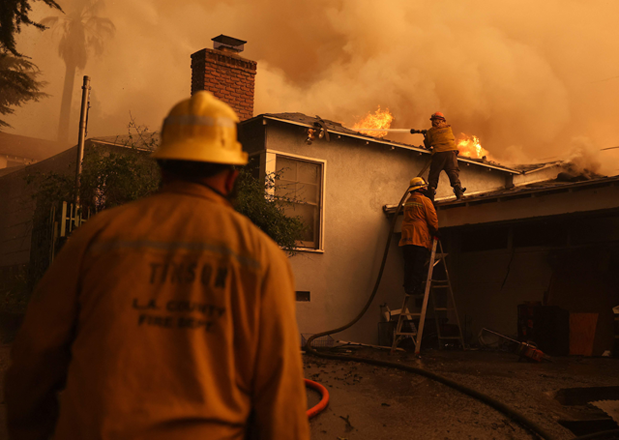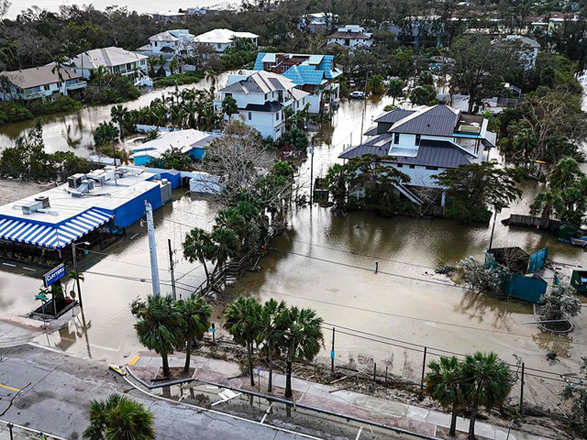You are here
Swiss Re estimates losses from natural disasters at $41b in first half
By AFP - Aug 30,2014 - Last updated at Aug 30,2014

ZURICH — Natural disasters caused total economic losses of $41 billion in the first six months of this year, much less than usual, reinsurance group Swiss Re estimated last week.
The figure released by the Zurich-based group — which combines both insured and uninsured losses — was down from $59 billion (45 billion euros) in the first half of 2013.
It was also about half the average first-half loss of the previous 10 years, which was $94 billion.
The insurance industry took a hit of $21 billion from disasters in the January to June period.
That was down from the $25 billion in payouts over the same period in 2013, and also below the $27 billion 10-year average.
The costliest disaster for the insurance sector was the thunderstorms and hail which hit the United States in mid-May, causing $3.2 billion in damage, of which $2.6 billion was insured.
Next came June’s storms in France, Germany and Belgium, where losses reached $2.7 billion, with $2.5 billion of that covered by insurers.
February’s snowstorm in Japan inflicted $5 billion in economic losses, but only half of that figured was insured.
The January snowstorm in the United States lead to economic losses of $2.5 billion, of which $1.7 billion was insured.
And May’s thunderstorms and tornadoes in the United States generated losses of $1.7 billion, with $1.1 billion of that covered.
Rich countries traditionally see the most expensive single disasters in terms of insurance claims, given their wealthier economies and extensive insurance penetration.
Poorer nations generally face a gap between overall economic damage and insurance payouts.
For example, May’s heavy flooding in Serbia, Bosnia and Croatia resulted in economic losses of $4.5 billion, but Swiss Re said insured losses were moderate due to low coverage.
Poorer nations also traditionally bear the brunt in terms of lives lost in disasters, which Swiss Re said reached 4,700 in the first six months of the year.
Man-made disasters were to blame for economic losses of $3 billion over the first half, with $2 of the sum insured.
In the first six months of 2013, man-made disaster losses had reached $5 billion, above the 10-year average of $4 billion.
Separately, a report published this month by an environmental think tank that monitors mankind’s impact on the planet indicated that, in under eight months, humanity has used up its yearly quota of replenishable Earth resources, “August 19 is Earth Overshoot Day 2014, marking the date when humanity has exhausted nature’s budget for the year,” the Global Footprint Network said in a statement. “For the rest of the year, we will maintain our ecological deficit... We will be operating in overshoot.”
The organisation tracks humanity’s demands on the planet against its ability to replenish resources like food and timber, and absorb waste like carbon dioxide from burning fuel for energy.
The cutoff point has been arriving earlier every year — in 1993 Earth Overshoot Day fell on October 21, in 2003 on September 22, and last year on August 20.
In 1961, the organisation remarked, humans used about three-quarters of the Earth’s annual resource budget.
This changed by the early 1970s, when economic and population growth increased our footprint beyond what the planet could renew in a year.
“Today, 86 per cent of the world population lives in countries that demand more from nature than their own ecosystems can renew,” the network said.
It calculated that 1.5 Earths would be needed to produce the renewable resources needed to support current consumption.
“Moderate population, energy and food projections suggest that humanity would require the biocapacity of three planets well before mid-century,” the network warned. “This may be physically unfeasible.”
The costs of unsustainable consumption can be seen in deforestation, water scarcity, soil erosion, species loss and a buildup of planet-warming CO2 in the atmosphere that threatens human well-being and countries’ economic stability, concluded the organisation.
Related Articles
FRANKFURT, GERMANY — Climate change fuelled natural disasters that caused $320 billion in losses last year, German reinsurance giant M
FRANKFURT — Insurers paid out around $27 billion for natural disaster claims last year with weather causing 94 per cent of incidents, unders
ZURICH — In a year set to be declared the hottest on record, natural disasters caused $310 billion in economic losses globally in 2024, as c


















